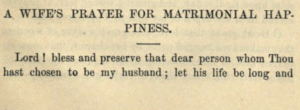Contributor(s): Shared on: 22 June 2020 under the Creative Commons Zero (CC 0) Universal license a Public Domain dedication Categories: Tags: | Contribute a translation | Source (English) |
|---|
|
Lord! bless and preserve that dear person whom Thou hast chosen to be my husband; let his life be long and blessed, comfortable and holy; and let me also become a great blessing and comfort unto him, a sharer in all his joys, a refreshment in all his sorrows, a meet helper for him in all the accidents and changes of the world; make me amiable for ever in his eyes, and very dear to him. Unite his heart to me in the dearest union of love and holiness, and mine to him in all sweetness, charity and compliance. Keep me from all ungentleness, all interestedness, and humor; and make me humble and obedient, useful and observant, that we may delight in each other according to Thy blessed word and ordinance, and both of us may rejoice in Thee, having our portion in the love and service of God forever. Amen. |
“A Wife’s Prayer for Matrimonial Happiness” is one of thirty prayers appearing in Rabbi Moritz Mayer’s collection of tehinot, Hours of Devotion (1866), of uncertain provenance and which he may have written. This prayer is tagged “problematic” owning to the explicit sexism projected onto the role of a woman in her marriage. –Aharon Varady Source(s)
 Rabbi Moritz Mayer (originally Moses Maier, later Maurice Mayer; 1821-1867) born in Dürckheim-on-the-Haardt, Germany, fled to the United States and to New York as a political refugee of the 1848 revolution. In 1859, after seven years as the rabbi of Ḳ.Ḳ. Beth Elohim in Charleston, South Carolina, he returned in poor health to New York where he contributed frequently to the Jewish press, and translated various German works into English: Rabbi Samuel Adler's catechism, Abraham Geiger's lectures on Jewish history, and Ludwig Philipson's pamphlet, Haben die Juden Jesum Gekreuzigt? (the Crucifixion from the Jewish Point of View), et al. In 1866, a number of his English translations of Fanny Neuda's teḥinot in German (from her Stunden Der Andacht, 1855/1858) were published in a volume he titled Hours of Devotion. The work also included a number of his own prayers as well as those of Marcus Heinrich Bresslau. The following year, Moritz Mayer passed away. He was 45 years old.(We are indebted to Anton Hieke for his research on Mayer, " Rabbi Maurice Mayer: German Revolutionary, Charleston Reformer, and Anti-Abolitionist" published in Southern Jewish Life, 17 (2014), pp. 45-89.)For Mayer's translations of prayers by other authors, please visit here. Aharon Varady (M.A.J.Ed./JTSA Davidson) is a volunteer transcriber for the Open Siddur Project. If you find any mistakes in his transcriptions, please let him know. Shgiyot mi yavin; Ministarot naqeni שְׁגִיאוֹת מִי־יָבִין; מִנִּסְתָּרוֹת נַקֵּנִי "Who can know all one's flaws? From hidden errors, correct me" (Psalms 19:13). If you'd like to directly support his work, please consider donating via his Patreon account. (Varady also translates prayers and contributes his own original work besides serving as the primary shammes of the Open Siddur Project and its website, opensiddur.org.) Read a comment / Leave a comment (moderated) Works of related interest: |












Leave a Reply